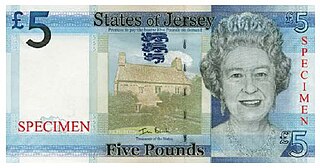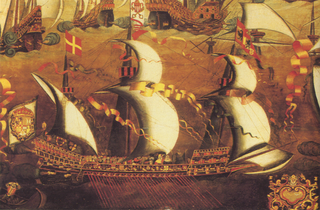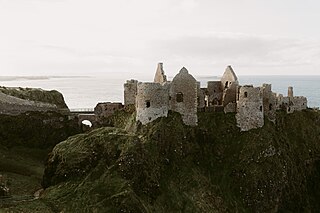
The pound sterling is the official currency of the United Kingdom, Jersey, Guernsey, the Isle of Man, British Antarctic Territory, South Georgia and the South Sandwich Islands, and Tristan da Cunha.

The Bank of Scotland plc is a commercial and clearing bank based in Edinburgh, Scotland, and is part of the Lloyds Banking Group. The bank was established by the Parliament of Scotland in 1695 to develop Scotland's trade with other countries, and aimed to create a stable banking system in the United Kingdom. The bank is the ninth oldest bank in continuous operation.

Clydesdale Bank is a trading name used by Clydesdale Bank plc for its retail banking operations in Scotland.

The Trustee Savings Bank (TSB) was a British financial institution that operated between 1810 and 1995 when it was merged with Lloyds Bank. Trustee savings banks originated to accept savings deposits from those with moderate means. Their shares were not traded on the stock market but, unlike mutually held building societies, depositors had no voting rights; nor did they have the power to direct the financial and managerial goals of the organisation. Directors were appointed as trustees on a voluntary basis. The first trustee savings bank was established by the Rev. Henry Duncan of Ruthwell in Dumfriesshire for his poorest parishioners in 1810, with its sole purpose being to serve the local people in the community. Between 1970 and 1985, the various trustee savings banks in the United Kingdom were amalgamated into a single institution named TSB Group plc, which was floated on the London Stock Exchange. In 1995, the TSB merged with Lloyds Bank to form Lloyds TSB, at that point the largest bank in the UK by market share and the second-largest by market capitalisation.

Ulster Bank is a large retail bank, and one of the traditional Big Four Irish clearing banks. The Ulster Bank Group was subdivided into two separate legal entities: National Westminster Bank Plc, trading as Ulster Bank ; and, until April 2023, Ulster Bank Ireland DAC. Prior to the closure of Ulster Bank in the Republic of Ireland in April 2023, the headquarters of Ulster Bank in the Republic of Ireland were located on George's Quay, Dublin, whilst the headquarters of Ulster Bank Northern Ireland are in Donegall Square East, Belfast, and it maintains a large sector of the financial services in both the UK and the Republic of Ireland.

Allied Irish Banks, p.l.c. is one of the so-called Big Four commercial banks in the Republic of Ireland. AIB offers a full range of personal, business and corporate banking services. The bank also offers a range of general insurance products such as home, travel and car. It offers life assurance and pensions through its tied agency with Irish Life Assurance plc.
The pound is the currency of Guernsey. Since 1921, Guernsey has been in currency union with the United Kingdom and the Guernsey pound is not a separate currency but is a local issue of sterling banknotes and coins, in a similar way to the banknotes issued in Scotland, England and Northern Ireland. It can be exchanged at par with other sterling coinage and notes.

The pound is the currency of Jersey. Jersey is in currency union with the United Kingdom, and the Jersey pound is not a separate currency but is an issue of banknotes and coins by the States of Jersey denominated in sterling, in a similar way to the banknotes issued in Scotland and Northern Ireland. It can be exchanged at par with other sterling coinage and notes.
The pound, or Manx pound, is the currency of the Isle of Man, at parity with sterling. The Manx pound is divided into 100 pence. Notes and coins, denominated in pounds and pence, are issued by the Isle of Man Government.

La Girona was a galleass of the 1588 Spanish Armada that foundered and sank off Lacada Point, County Antrim, on the night of 26 October 1588, after making its way eastward along the north coast of Ulster. The wreck is noteworthy for the great loss of life that resulted and the treasures recovered.

Ireland has a history of trading its own banknotes for several centuries, both when the whole of Ireland was one legal entity, and following partition of the island into the Republic of Ireland and Northern Ireland. Notes have been issued by individual banks and by state agencies of the Republic of Ireland and the United Kingdom. Currently, various commercial banks in Northern Ireland locally issue notes of the Pound sterling, while the Central Bank of Ireland, in the Republic of Ireland, issues local euro banknotes.

Dunluce Castle is a now-ruined medieval castle in Northern Ireland, the seat of Clan MacDonnell. It is located on the edge of a basalt outcropping in County Antrim, and is accessible via a bridge connecting it to the mainland. The castle is surrounded by extremely steep drops on either side, which may have been an important factor to the early Christians and Vikings who were drawn to this place where an early Irish fort once stood.
Banknotes have been issued for use specifically in Northern Ireland since 1929, and are denominated in pounds sterling. They are legal currencies, but technically not legal tender anywhere. This is not uncommon as most bank notes are not recognised as tender. However, the banknotes are still widely accepted as currency by larger merchants and institutions elsewhere in the United Kingdom. Issuing banks have been granted legal rights to issue currency, and back the notes with deposits at the Bank of England.
AIB Group (UK) p.l.c. is a subsidiary of Allied Irish Banks. It is registered in Northern Ireland. Regulated by the Financial Services Authority, it serves as the legal entity for the United Kingdom banking division of the group.

Portballintrae is a small seaside village in County Antrim, Northern Ireland. It is four miles east of Portrush and two miles west of the Giant's Causeway. In the 2011 census, Portballintrae had a population of 601, a decline of 18% compared to 2001. It lies within the Causeway Coast and Glens District Council area.

The Bank of England, which is now the central bank of the United Kingdom, British Crown Dependencies and British Overseas Territories, has issued banknotes since 1694. In 1921 the Bank of England gained a legal monopoly on the issue of banknotes in England and Wales, a process that started with the Bank Charter Act 1844, when the ability of other banks to issue notes was restricted.

Banknotes of Scotland are the banknotes of the pound sterling that are issued by three Scottish retail banks and in circulation in Scotland. The Bank of Scotland, the oldest bank operating in the country, was the first bank in Europe to successfully print its own banknotes in 1695. The issuing of banknotes by retail banks in Scotland is subject to the Banking Act 2009, which repealed all earlier legislation under which banknote issuance was regulated, and the Scottish and Northern Ireland Banknote Regulations 2009. Currently, three retail banks are allowed to print notes for circulation in Scotland: Bank of Scotland, Royal Bank of Scotland, and Clydesdale Bank.
The Ulster Bank £50 note is a banknote issued by Ulster Bank. It is valued at fifty pounds sterling and the current design was first issued in 1997. As with most banknotes of Northern Ireland, they can be used for transactions in the Isle of Man and Great Britain, but in practice most retailers will not accept them and they are not legal tender.
The Ulster Bank £100 note is a banknote issued by Ulster Bank. It is valued at one hundred pounds sterling and the current design was first issued in 1990. As with most banknotes of Northern Ireland, they can be used for transactions in the Isle of Man and Great Britain, but in practice most retailers will not accept them and they are not legal tender in England, Scotland or Wales.













